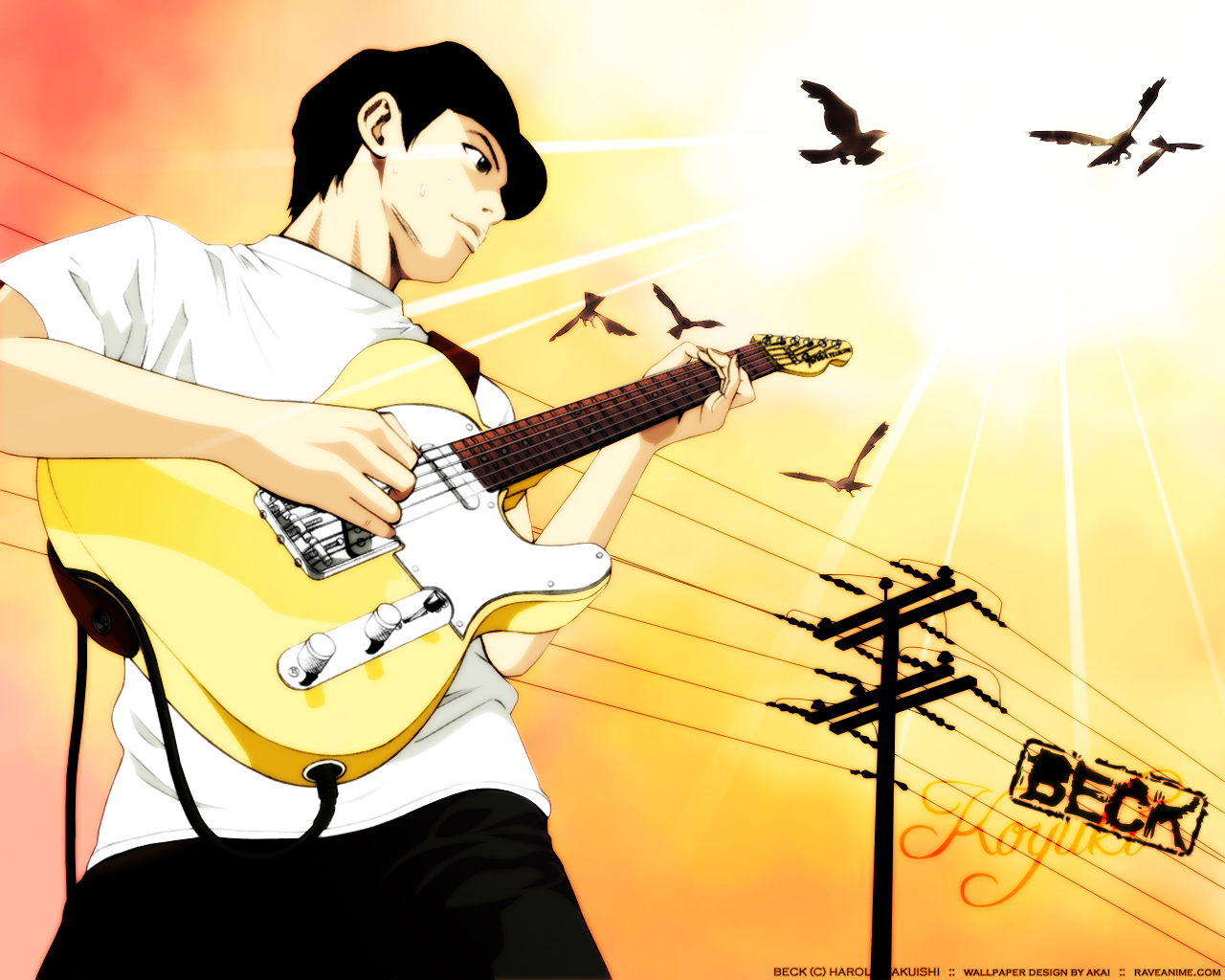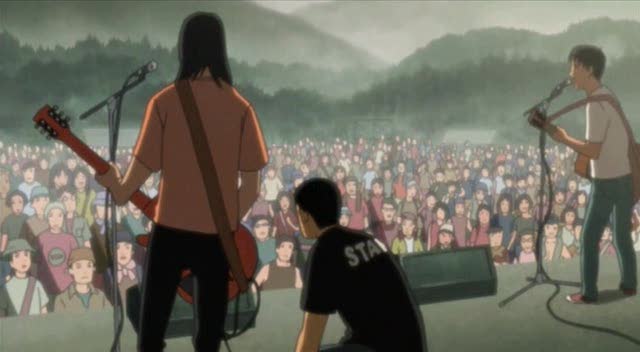Beck: Mongolian Chop Squad
September 14, 2016 · 1 comment
By Andrew Osmond.
 Popular music and animation should go together like Lennon and McCartney; Simon and Garfunkel; Pinky and Perky. The animated music video is an established genre; animated music bands have broken the West in the shape of the anime-influenced Gorillaz. However, there aren’t many pop-music dramas in Western animation, and none of the big studios have tried one. There’s a rotoscoped Ralph Bakshi film, American Pop; the adult Spanish drama Chico and Rita; the British TV cartoon of Terry Pratchett’s fantasy Soul Music; and Canada’s very oddball Rock & Rule (1981), which featured Debbie Harry, Lou Reed and imagery foreshadowing the next decade of anime. Beyond that, it’s mostly retro kiddie fare like Alvin and the Chipmunks and Josie and the Pussycats.
Popular music and animation should go together like Lennon and McCartney; Simon and Garfunkel; Pinky and Perky. The animated music video is an established genre; animated music bands have broken the West in the shape of the anime-influenced Gorillaz. However, there aren’t many pop-music dramas in Western animation, and none of the big studios have tried one. There’s a rotoscoped Ralph Bakshi film, American Pop; the adult Spanish drama Chico and Rita; the British TV cartoon of Terry Pratchett’s fantasy Soul Music; and Canada’s very oddball Rock & Rule (1981), which featured Debbie Harry, Lou Reed and imagery foreshadowing the next decade of anime. Beyond that, it’s mostly retro kiddie fare like Alvin and the Chipmunks and Josie and the Pussycats.
Anime, of course, has a whole medley of pop-music dramas, from the realistic to the far-out. Pop singers play central roles in the Macross space franchise and Bubblegum Crisis, while the French-Japanese Interstellar 5555 assembled an album’s worth of music videos into a feature-length sci-fi story. On Earth, we’ve seen bubbly schoolgirl bands (K-ON!), psycho idol singers (Perfect Blue), female punk rockers (Nana) and 1960s jazz jammers (Kids on the Slope). Manga goes further; we’re still awaiting a translation of Kaji Kawaguchi’s We Are the Beatles, in which a Japanese tribute band time-travels to 1960s Liverpool and tries to supplant the Fab Four.
And then there’s Beck. Animated by Madhouse, which also made Perfect Blue and Nana, the saga is told over 26 episodes (released by Anime Limited as a single collection). The cast is large, but primarily it’s the story of two teenage boys. One is Yukio, nicknamed by everyone as Koyuki (“ko” means little). The name is a measure of his immaturity and naivety, and his need to prove himself; he’s the underdog and our viewpoint. The other boy is a glaring contrast, the world-wise Ryusuke, a master guitarist and musician in a shack by a fishing-hole; John Lennon meets Huck Finn.
Beck is both the name of the new band Ryusuke forms, and the drama of Koyuki’s growing up over time (the seasons are highlighted). The band drama covers the alpha-male rivalries, the struggle to rise in a corrupt and dangerous industry – the show’s second half has a big crime subplot. It’s also, of course, the story of Koyuki trying to define himself, and his joys and heartbreaks while growing up, fuelling his budding music talents. While Koyuki and Ryusuke are on different levels, both boys will find themselves out of their leagues; can they rise to the occasion?
 The series is also about sex, and Koyuki’s fearful adolescent dealings with girls. There’s one practically next door – Koyuki’s childhood friend, Izumi – and an exotic kind-of foreigner, Ryusuke’s truculent sister Maho. While they’re Japanese, Ryusuke and Maho both grew up in New York, disconcerting Koyuki with their frequent switches to English. Maho’s angry first words to Koyuki are an unusual meet cute – “Who the fuck are you?” Other characters drop into English speech in the Japanese version; you can amuse yourself ranking the actors by how convincing (or not) they sound.
The series is also about sex, and Koyuki’s fearful adolescent dealings with girls. There’s one practically next door – Koyuki’s childhood friend, Izumi – and an exotic kind-of foreigner, Ryusuke’s truculent sister Maho. While they’re Japanese, Ryusuke and Maho both grew up in New York, disconcerting Koyuki with their frequent switches to English. Maho’s angry first words to Koyuki are an unusual meet cute – “Who the fuck are you?” Other characters drop into English speech in the Japanese version; you can amuse yourself ranking the actors by how convincing (or not) they sound.
Beck’s male friendships broadly parallel Shinichiro Watanabe’s later Kids on the Slope, pairing a naïve, immature boy and a far cooler, manlier guy. At the start of the series, Koyuki is 14 and Ryusuke is 16 – never does a two-year age gap feel like such a gulf. There’s hinted homoeroticism in Koyuki’s admiration of his senior, though played up far less than in Kids on the Slope (or in the openly gay pop anime Gravitation). We see that Ryusuke has casual girlfriends, and slides Koyuki a condom when it seems the lad may be initiated. There are a couple of memorable ‘how far will this go?’ scenes: a lovely languid meeting in a moonlit pool could be set to REM’s “Nightswimming.”
The Beck anime was first broadcast in 2004, the year Madhouse made Monster and Paranoia Agent. Beck’s style is broadly realistic but comes with a punch; against the elegantly elongated characters of many anime, here the figures seem slightly compressed, ready to hit out like a jack-in-the-box. Most abrasively, there are close-ups of biting teeth and rough lips. The animation can be eccentric in ways to have some fans complain of off-model sloppiness, but it often gives the images a graphic life; for example, a manic, vibrantly ungainly sequence in part 22, where Koyuki cycles frantically to Ryusuke’s shack.
“[Director] Osamu Kobayashi’s experience with this kind of thing is in full evidence,” wrote Carl Kimlinger in a review for Anime News Network. “He regulates mood with consummate skill, evoking ennui or isolation with no more than an empty composition, a cut to some incidental detail, or some beautifully refined use of background noise.”
 The moody background shots invite us into the characters’ quotidian world and their associated emotions: an alley where Koyuki snatches breaks from his hectic restaurant job, a concrete embankment by a still river, an omnipresent moon. Not all the crowd shots work in the music scenes, but many do; a half-realist, half-cartoony set-piece in part 4 captures the manic aggression of a confined basement club. But it’s not all butting egos. A later sequence has two characters play the blues together in a half-jam, half-duel, oblivious to the lethally dangerous situation which brought them together; it echoes the duelling banjo scene in Deliverance.
The moody background shots invite us into the characters’ quotidian world and their associated emotions: an alley where Koyuki snatches breaks from his hectic restaurant job, a concrete embankment by a still river, an omnipresent moon. Not all the crowd shots work in the music scenes, but many do; a half-realist, half-cartoony set-piece in part 4 captures the manic aggression of a confined basement club. But it’s not all butting egos. A later sequence has two characters play the blues together in a half-jam, half-duel, oblivious to the lethally dangerous situation which brought them together; it echoes the duelling banjo scene in Deliverance.
The animators go to town on a scene-stealing support character, the unsinkable Mr Sato, a pudgy forty-something who’s a champion swimmer, a struggling company man, an arrested adolescent, a maniac P.E. coach and a kindly music mentor to Koyuki. Sato and his parrot (another scene-stealer) prove central to the plot, with the parrot’s musical instincts adding a touch of magic; another touch is bestowed by a dream shared by several of Beck’s characters, involving the likes of Lennon, Freddie Mercury and Sid Vicious. It’s handled playfully tongue-in-cheek, in the manner of some of Satoshi Kon’s anime, or possibly Wayne’s World 2
A fan of vintage Britpop, Mr Sato tells Koyuki of a (fictional) British band called Rocket Boys, who made one great album and then disappeared. More than one supporting character in Beck turns out to be an amazing musician who never went pro. Beck’s big question is if the band will be evanescent, killing the friendships which birthed it. We don’t find out till the end. Beck’s climax goes cinematically big, set at a massive open-air festival modelled on Glastonbury and founded by a dead visionary resembling Yoko Ono. We get plenty of Beck’s own music, but a key sequence involves a cover of the late Beatles song “I’ve Got a Feeling”; it’s a moment to rival the violin “Country Road” in Ghibli’s Whisper of the Heart.
The series comes from a long-running manga by Takahiro “Harold” Sakuishi, in Kodansha’s Monthly Shonen Magazine from 1999 to 2008, which snagged its creator the 26th Kodansha Manga Award in 2002. An avowed fan of the Red Hot Chili Peppers, Sakuishi brought a playful in-jokery to his manga opus, and could often be found sneaking the likenesses of famous pop stars into his crowd scenes. His other works included the baseball epic Stopper Busujima (which had a minor character cross-over with Beck), and the madcap Seven Shakespeares, which suggests that the seven “missing years” from Shakespeare’s biography were spent in Liverpool’s Chinatown (not actually built until 1834), where the mysterious Dark Lady of sonnet fame turns out to be a refugee from Ming China. As in Shakespeare in Love, incidents in young William’s life provide him with the ideas and experience he would later fashion into his world-famous scripts. Jonathan Clements described it in NEO magazine as “endearingly bonkers,” but sadly it has never been translated.
 The name Beck, by the way, is nothing to do with the American musician of the same name; the anime adds the subtitle “Mongolian Chop Squad” for reasons explained in the story (savvy readers may guess). The manga also inspired a PS2 game and a live-action film, five years after the anime. The movie cheats on a vital point; Koyuki is meant to have an exceptional voice, yet we never hear it. The anime goes for a lesser cheat; when Koyuki sings, his speaking voice (actor Daisuke Namikawa) is switched for singer Kazuya Hirabayashi of the bands Husking Bee and Fine Lines. In the same way, the rapping of Beck’s frontman Chiba is supplied by “Tatsuzo” of the band YKZ, also known as Yakuza Kick. But listen out in the English dub version, co-directed by voice-acting superstar Taliesin Jaffe, because the English cast get to rock out, performing their own newly-recorded versions of the Japanese originals.
The name Beck, by the way, is nothing to do with the American musician of the same name; the anime adds the subtitle “Mongolian Chop Squad” for reasons explained in the story (savvy readers may guess). The manga also inspired a PS2 game and a live-action film, five years after the anime. The movie cheats on a vital point; Koyuki is meant to have an exceptional voice, yet we never hear it. The anime goes for a lesser cheat; when Koyuki sings, his speaking voice (actor Daisuke Namikawa) is switched for singer Kazuya Hirabayashi of the bands Husking Bee and Fine Lines. In the same way, the rapping of Beck’s frontman Chiba is supplied by “Tatsuzo” of the band YKZ, also known as Yakuza Kick. But listen out in the English dub version, co-directed by voice-acting superstar Taliesin Jaffe, because the English cast get to rock out, performing their own newly-recorded versions of the Japanese originals.
Andrew Osmond is the author of 100 Animated Feature Films. Beck: Mongolian Chop Squad is released in the UK by Anime Limited.
anime, Beck, Harold Sakuishi, Japan, Mongolian Chop Squad, music, Osamu Kobayashi, Shakespeare, The Beatles
James C
October 12, 2016 12:40 am
Fantastic article. I first watched this show back when I was 14 around the time that I started playing in bands so it also has a special significance to me. I've been rewatching it since your DVD release. I'd always considered this my favourite TV show since I first watched it nearly 10 years ago but I've been suprised in rewatching it how much I'd never picked up on and it's brought a whole new dimension to the show for me. I'd just like to say thank you so much for finally releasing this DVD. I'd been eagerly waiting on this release since you announced it and I'm so glad I can finaly just own the complete series.